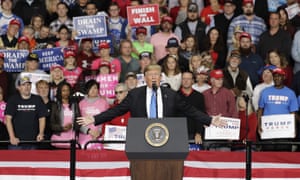
“We’re going to win so much, you’re going to be so sick and tired of winning,” Donald Trump promised on the campaign trail ahead of his election. And as the president faces his first midterm vote, the big test for Trump will be whether voters are sick of winning, or sick of him.
On many measures, the US economy has boomed under Trump. Unemployment is at lows unseen since the first moon landing, stock markets remain close to record highs, business confidence is up, trade agreements Trump has slammed as “unfair” are being rewritten. On Friday the government’s latest jobs report showed wages were rising at their highest rate since 2009.
If the Republicans come through in Tuesday’s vote and outperform expectations – despite Trump’s unpopularity – then no doubt a lot of pundits will be using the campaign quote coined by James Carville, strategist to Bill Clinton, to explain the outcome: “It’s the economy, stupid.”
Trump is pushing his hard line on immigration harder than his economic record. Polling shows economic issues become less of a factor when the economy is on a sound footing.
Immigration may play well to his base but swing voters will decide this election, and the economy is still a big issue. According to Gallup, in September, 13% of US voters rated economic issues as their highest priority, equal to the number concerned about immigration.
Wavering voters may well be looking to the numbers while they decide who gets their vote. The top line for “Trumponomics” looks good. A deeper dive exposes some uncomfortable facts about the US economy, but the headlines could be enough to propel the Republicans back into office.
Unemployment rate
The US unemployment rate hit 3.7% in September, its lowest rate since 1969. The US has now added jobs for 96 consecutive months, the longest streak of jobs growth since records began. The majority of those jobs were added under Barack Obama’s presidency but, hey … he’s no longer president.
But what kind of jobs have been added? Wage growth has lagged behind jobs growth since the recession, suggesting that the kinds of jobs the US is adding are lower-waged and that, thanks in part of the decline of unions, employers still have the upper hand in pay negotiations despite the tight labor market.
Mining has added 53,000 jobs over the past year; Trump campaigned on ending “the war on coal”. But compare that with healthcare, where there are many low-paid jobs, which has added 302,000 jobs.
The proof is in workers’ pockets. October’s job report showed wages growing at an annual rate of 3.1%, the highest rate since 2009, but still well below the 4.2% average right before the 2001 recession.
[“source=carwale]




